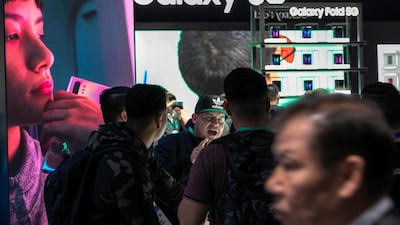Samsung, the world’s largest manufacturer of smartphones, sold more than 6.7 million Galaxy 5G phones globally in 2019.
The South Korean company, which offers five Galaxy 5G devices – the Galaxy S10, Note10, Note10+, A90 and Fold – said it accounted for 53.9 per cent of the 5G smartphone market worldwide by the end of November.
“2020 will be the year of Galaxy 5G,” said TM Roh, president of Samsung's IT and mobile communications division. “We are excited to bring 5G to even more device categories and introduce people to mobile experiences they never thought possible."
Samsung’s Galaxy Tab S6 5G, set for release in South Korea in the first quarter of this year, will be the world’s first 5G tablet.
With a wider global roll out of the 5G network expected this year, smartphone companies are gearing up to unveil more 5G-enabled devices. Manufacturers such as Huawei, LG and OnePlus are already selling 5G phones but have not disclosed the number of devices sold so far.
Chinese brand Xiaomi said it will launch 10 5G phones this year, while US manufacturer Apple is expected to unveil four new iPhones with 5G connectivity in September.
The global smartphone market is set to grow almost 1.5 per cent in 2020 with shipment volumes a little more than 1.4 billion, according to a projection by the International Data Corporation. This will mark a turnaround for the market, which is forecast to drop 1.4 per cent in 2019, compared to 2018, when data from the final quarter of the year is released.
IDC expects 190 million 5G smartphones shipments in 2020 – almost 14 per cent of total volumes – which significantly surpasses the first year of 4G shipments in 2010 of 1.3 per cent. 5G smartphones contributed close to 1 per cent of global smartphone sales last year.
A 5G network promises an internet speed of up to 1.2 gigabits per second, which will gradually reach 10Gbps — more than 100 times faster than 4G. It also offers a latency of less than one millisecond, compared to 20 milliseconds for a 4G network.
“With tremendous 5G growth opportunities on the horizon, Samsung, over the next decade, is in a great position to capitalise by further investing and building on the early lead and momentum,” said Neil Shah, vice-president of research at Hong Kong-based Counterpoint.


